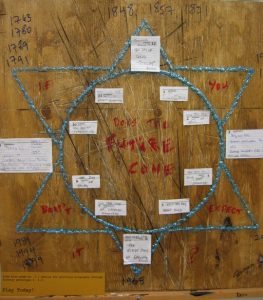Day 002- Play Today! Calendar

To re-search is therefore also to re-cycle. Made for a collective research probe into the history and cultural logic of calendars, this time bias poem is a device for plotting the intersection of history and biography. The game-poem invites one to play with the everyday, as we must, through the throw of a pair of dice in order to plot the flux of one’s being-here-or-there in relation to a set of dates, the significance of which one might or might not remember. Like the obsession with astrology, then, except the constellatory signs here were fateful revolutions all of them. What did I learn? What can I still learn from it? I asked back then, before I could imagine all the questions posed by Feminist Energy Futures, “Does the Future Come, If You Don’t Expect It?”. This question is still on the table. Herculean science has great trouble with the future even if it seems sometimes to expect it because it also expects it to stay the same. Every scientific or philosophical concept of time is contaminated by what the Herculean tradition calls “subjectivity”. Or rather, in their alleged objectivity, such concepts are, ultimately, the “space-biased” forgetfulness or repression of two worlds; the world of children and the world of the dying. If there is still time, then it is the ecological labour of care, the environmental passage connecting these worlds. For a long time now such care has been largely subalternized as women’s work and feminized as subaltern work. Nothing is sustainable that does not reproduce this care that enables the intergenerational reproduction of households and their ecosystems. Politics is always about whether we allocate energy to care or not and Herculean power is the accumulated violence of this politics turned into instruments of mapping time into space. Energy, a translation device like this game, is not a resource; energy is a medium and that is its historical message. If we don’t expect it, what happens? The future or disaster?